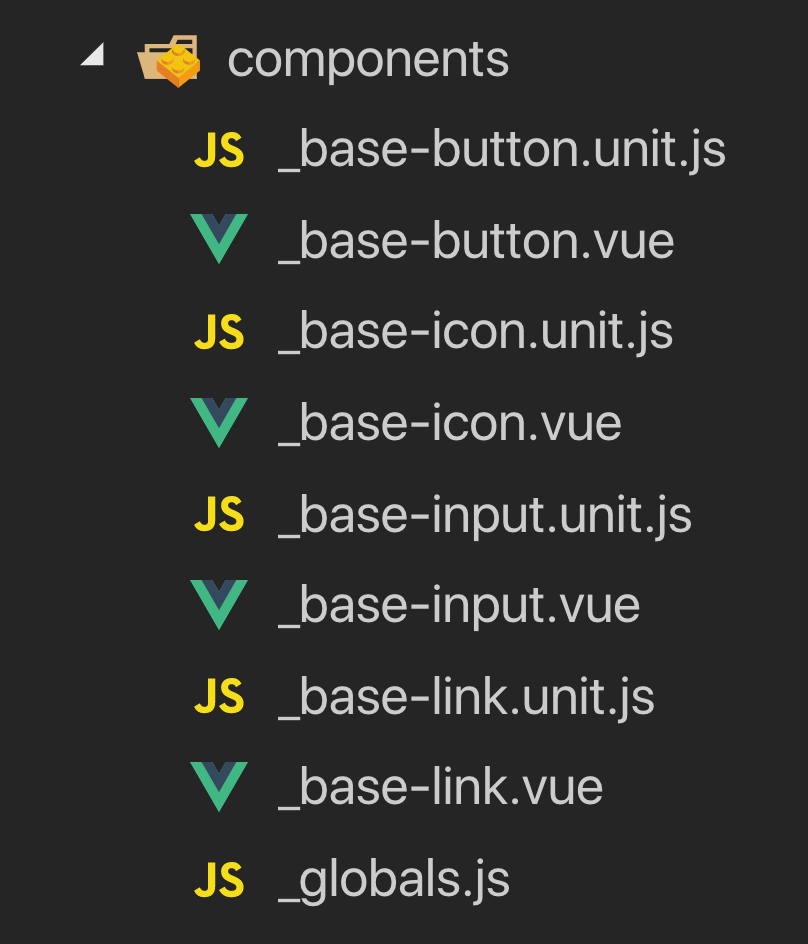Enterprise Vue
patterns that scale

My background
What does "enterprise" mean?
What I'll talk about
- Is Vue enterprise-ready?
- Getting started
- Organizing large apps
- Working in a team
- Testing
- Sharing between teams/apps
- Optimizing performance
- Vue 3
These slides are a resource list!
Is Vue enterprise-ready?
Yes
Progressive integrations
Getting started
Vue Enterprise Boilerplate
even for existing projects
Organizing large apps
Component organization
flat vs nested
Flat makes refactors easier
no need to update imports after moving a component
Flat makes finding files easier
folder scoping leads to lazily named files, because they don't have to be unique
Wrap vendor components
More easily switch to an alternative
Control the interface
boilerplate: src/components/_base-icon.vue
Base components

Vuex module registration
import Vue from 'vue'
import Vuex from 'vuex'
import auth from './modules/auth'
import cart from './modules/cart'
import dashboard from './modules/dashboard'
import userSettings from './modules/userSettings'
import products from './modules/products'
import users from './modules/users'
Vue.use(Vuex)
const store = new Vuex.Store({
modules: {
auth,
cart,
dashboard,
userSettings,
products,
users
}
})😳
Automatic Vuex module registration
import Vue from 'vue'
import Vuex from 'vuex'
import modules from './modules'
Vue.use(Vuex)
const store = new Vuex.Store({ modules })boilerplate: src/state/modules/index.js
Custom module defaults
const store = new Vuex.Store({ modules })
// Automatically run the `init` action for
// every module, if one exists.
dispatchActionForAllModules('init')modules[modulePath.pop()] = {
// Modules are namespaced by default
namespaced: true,
...requireModule(fileName),
}boilerplate:
boilerplate:
Grouped state helpers
import { mapState, mapGetters, mapActions } from 'vuex'
export const authComputed = {
...mapState('auth', {
currentUser: state => state.currentUser,
}),
...mapGetters('auth', ['loggedIn']),
}
export const authMethods = mapActions('auth',
['logIn', 'logOut']
)
boilerplate: src/state/helpers.js
Using state helper groups
import {
authComputed,
authActions
} from '@state/helpers'
export default {
computed: {
...authComputed,
},
methods: {
...authActions,
},
}Working in a team
(making it easy to follow best practices)
Why?
Faster development
great tooling can not only catch typos and potential errors, but also teach new features as developers need them
More useful code reviews
Faster reviews, more learning, more motivating
Higher quality code
when developers feel cared for by their tooling, they take more pride in their work and write better code
Pre-commit guards
(with lint-staged and yorkie)
module.exports = {
'*.js': [
'yarn lint:eslint',
'yarn lint:prettier',
'git add',
'yarn test:unit:file',
],
'*.vue': [
'yarn lint:eslint',
'yarn lint:stylelint',
'yarn lint:prettier',
'git add',
'yarn test:unit:file',
],
'*.scss': ['yarn lint:stylelint', 'yarn lint:prettier', 'git add'],
'*.md': ['yarn lint:markdownlint', 'yarn lint:prettier', 'git add'],
'*.{png,jpeg,jpg,gif,svg}': ['imagemin-lint-staged', 'git add'],
}
Build generators
with Hygen
Reduce friction
speed up development and simplify refactors
Enforce best practices
e.g. automatically generate a unit test with each module
Meta validations
Meta validations
methods: {
// Perform more complex prop validations than is possible
// inside individual validator functions for each prop.
validateProps() {
if (process.env.NODE_ENV === 'production') return
// Check for insecure URL in href.
if (!this.allowInsecure && !/^(https|mailto|tel):/.test(this.href)) {
return console.warn(
`Insecure <BaseLink> href: ${
this.href
}.\nWhen linking to external sites, always prefer https URLs.`
)
}
}
}More useful patterns
in the Vue Style Guide
Testing
Testing
we stop writing and running tests when they're NOT...
Visible
Everyone knows when
tests are failing
Reliable
Tests don't fail intermittently
Fast
Tests run quickly
Debuggable
When a test fails,
it's easy to learn why
Tool recommendations
- Cypress for almost all e2e tests
- TestCafe for e2e testing cross-browser inconsistencies, with screenshot diffing
- Jest + Vue Test Utils for unit tests
Just test everything?
Are you flossing
after every meal?

Two essential E2E tests
- Can users log in?
- Can they give us money?
Sharing between teams/apps
Shared component library?
Shared component library
3 tips
- Monorepos
- Monorepos
- Monorepos
Monorepo !== Monolith
Monorepo != Monolith
Defining a monorepo
A single codebase, with independently deployable/publishable projects that share some common resources
Benefits of monorepos
Faster development
Easier to reorganize
Monorepo tooling
Performance
Stateless and instance-less
(no data, computed, etc and no lifecycle)
<template functional>
<!-- ... -->
</template>export default {
functional: true,
render (h, context) {
// ...
}
}
or
Functional components
Improve performance
(especially for components rendered many times, e.g. with a v-for)
Can return multiple root nodes
boilerplate: src/components/nav-bar-routes.vue
Functional components
Lazy-loaded routes
{
path: '/admin',
name: 'admin-dashboard',
component: () => import('@views/admin'),
}{
path: '/admin',
name: 'admin-dashboard',
component: require('@views/admin').default,
}<keep-alive>
<component :is="currentTabComponent" />
</keep-alive>Avoid expensive rerenders
Enterprise apps with Vue 3
The composition API
in Vue 3
The composition API
helps tame monster components
-
Easier refactoring
-
More flexible architecture
-
First-class TypeScript support
The composition API
can also be useful for global state management
Learn more about the composition API
That's all!
Special thanks to my Vuesionary sponsors
- Vuetify
- Vue School
- Vue Mastery
- Ben Hong
@chrisvfritz